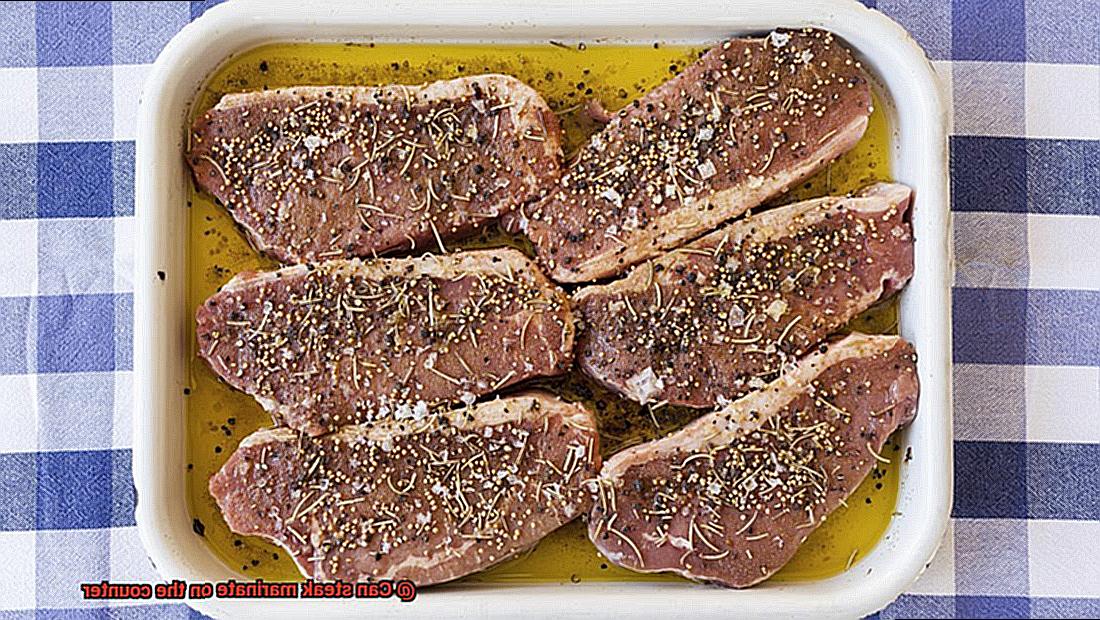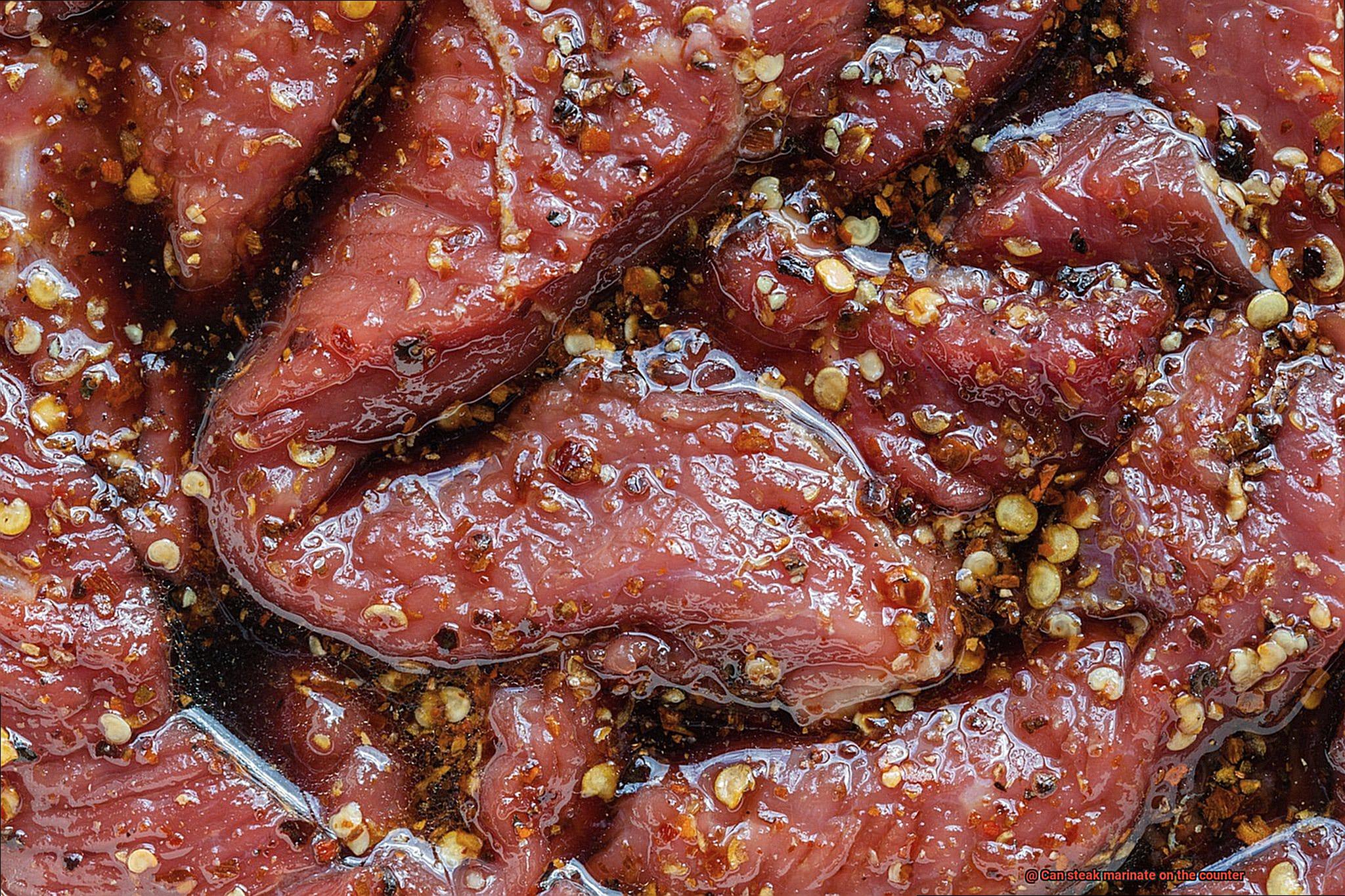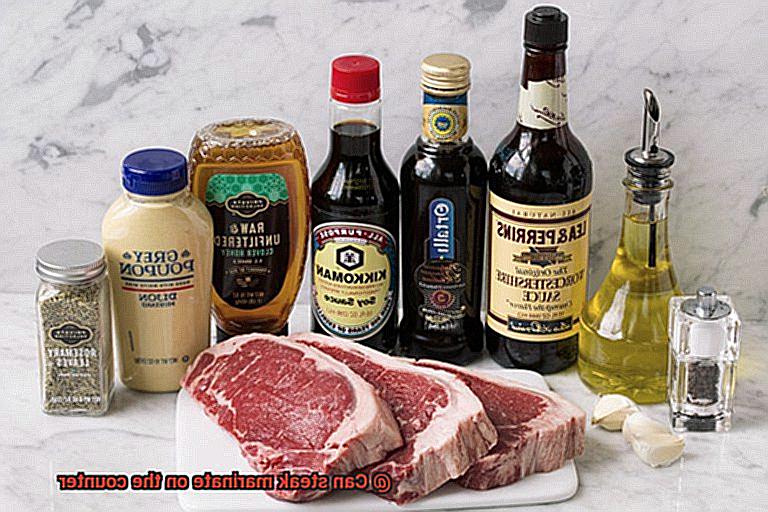A sizzling, mouth-watering steak fresh off the grill, perfectly seasoned and bursting with flavor.
It’s enough to make any carnivore’s heart skip a beat. But before you can sink your teeth into that juicy goodness, there’s one crucial step you don’t want to overlook: marinading.
Marinading is an excellent way to infuse your steak with all sorts of delicious flavors and tenderize the meat for maximum juiciness. But where should you let your steak soak up all those tasty marinade juices?
Can it sit out on the counter for a while, or do you need to keep it in the fridge? If you’re like many curious cooks out there, you’ve probably wondered about this very question.
And it’s not just about food safety – leaving your steak out too long can also affect its taste and texture. So what’s the verdict?

Can you marinate steak on the counter without any negative consequences? In this post, we’ll dive deep into the nitty-gritty details of marinating steak on the counter.
We’ll explore how marinades work their magic, and what factors can impact their effectiveness. We’ll also take a closer look at how temperature and time play into achieving that perfect steak, and share some tips and tricks for ensuring success every time.
So, let’s get started.
Contents
What is Marinating?
Get ready to take your meat dishes to the next level with marinating – a cooking technique that’s like a luxurious spa day for your food.
This process involves soaking meat, fish, or vegetables in a flavorful liquid mixture before cooking to add a burst of flavor, tenderize the meat, and sometimes preserve it.
The possibilities for marinades are endless as you can use a variety of liquids such as oil, vinegar, citrus juice, wine, yogurt, or a combination of these.
The ingredients used in a marinade can vary widely depending on the desired flavor profile and type of meat being marinated.
With options like herbs, spices, garlic, onions, soy sauce, honey, mustard, and more, you can create a unique taste that will tantalize your taste buds.
The length of time needed for marinating depends on the type of meat and the strength of the marinade. For example, delicate seafood may only need 30 minutes of marination while tougher cuts of beef may require several hours.
However, be careful not to over-marinate as this can result in mushy or overly acidic meat. Before diving into marinating, let’s talk about food safety.
Leaving meat out at room temperature can create a breeding ground for harmful bacteria to grow. That’s why it’s essential to marinate your meat in the fridge between 40°F and 140°F.
This will keep it at a safe temperature while allowing it to absorb all those delicious flavors from the marinade. In conclusion, marinating is an excellent way to add flavor and texture to your meat dishes.
Is it Safe to Marinate Steak on the Counter?
The answer isn’t a simple “yes” or “no,” but there are some essential things to keep in mind.
Firstly, bacteria thrive in warm and moist environments, which can lead to food poisoning if consumed. To avoid this risk, make sure your steak is refrigerated until you’re ready to start marinating.
Leaving perishable foods like meat out at room temperature for more than two hours can be risky, so take precautions to prevent bacterial growth. Once you begin marinating, maintain a consistent temperature of 40°F or below to ensure your steak remains safe to eat.
This can be achieved by storing the meat in a sealed container or plastic bag in the refrigerator. Proper refrigeration can help prevent bacterial growth and keep your steak at a safe temperature.
Another critical factor to consider is the acidity of your marinade. While acids like vinegar and citrus juices can add flavor and tenderness to your meat, they can also break down proteins and make your steak more vulnerable to bacterial growth.
To reduce this risk, use a marinade with a pH level of 4.6 or lower. Overall, it is possible to marinate your steak on the counter safely if you take precautions to prevent bacterial growth and ensure that your meat remains at a safe temperature throughout the process.
The Dangers of Marinating at Room Temperature
When you leave your steak to marinate at room temperature, you create a perfect breeding ground for bacteria to multiply rapidly.
In hot summer months or warmer climates, harmful bacteria like Salmonella can double in number every 20 minutes. So, in just an hour, the number of bacteria on your steak can increase by a shocking six times.
This bacteria can cause food poisoning, and the symptoms can range from mild to severe, including diarrhea, vomiting, and abdominal cramps. In severe cases, it can even lead to hospitalization or death.
But that’s not all – leaving your steak out on the counter to marinate can also impact its taste and texture. Over-marination or using acidic marinades with a pH level of 4.6 or lower can break down the meat fibers, leaving it with a mushy texture and an overpowering flavor that masks its natural taste.
So, how can you ensure that your steak is safe to eat while also preserving its delicious taste? The answer is simple: refrigeration.
Marinate your steak in a clean container and cover it tightly with plastic wrap or a lid before storing it in the refrigerator. If you’re short on time, use a vacuum-sealed bag or a ziplock bag and submerge it in a bowl of ice water to keep the temperature low while allowing flavors to infuse.
Recommended Temperature for Marinating Steak
Before you start marinating, it’s crucial to know the recommended temperature range for this process.
Not only will this ensure a delicious result, but it will also keep you safe from harmful bacteria. The ideal temperature for marinating steak is between 40°F (4°C) and 140°F (60°C).
This range is often called the “danger zone” for food safety because bacteria can multiply rapidly within it. To avoid this risk, always marinate your steak in the refrigerator, where the temperature stays below 40°F (4°C).
Marinating in the refrigerator not only guarantees food safety but also allows the flavors to develop slowly over time. This results in a mouthwatering steak that is tender, juicy, and full of flavor.
If you’re in a hurry and don’t have time to marinate your steak in the refrigerator, you can do it at room temperature for up to two hours.
But be careful not to leave it out for too long as this increases the risk of bacterial growth and foodborne illness.
Marinate in the refrigerator to allow flavors to develop slowly over time, or at room temperature for up to two hours when pressed for time.

Tips for Properly Marinating Steak
Marinating your steak is the perfect solution to add flavor and tenderness to your meat. But, how do you do it properly without any food safety concerns? Here are six tips for marinating steak that will make your taste buds dance with joy.
Use a Non-Reactive Container
When marinating steak, it’s important to use a non-reactive container such as glass or stainless steel. Avoid using aluminum or copper containers as they can react with the acid in the marinade and cause the steak to taste metallic.
Marinate in the Refrigerator
It’s essential to marinate steak in the refrigerator, not on the counter. Leaving the meat out at room temperature can lead to bacterial growth and cause food poisoning. Therefore, use a resealable plastic bag or a shallow dish that is just large enough to hold the steak and put it in the refrigerator right away.
Don’t Marinate for Too Long
While marinating can tenderize and flavor the steak, marinating for too long can actually have the opposite effect and make the meat mushy. The general rule of thumb is to marinate steak for no more than 24 hours.
Pat Dry Before Cooking
Before cooking your marinated steak, be sure to pat it dry with paper towels. This will help ensure a nice sear and prevent any excess moisture from causing steaming instead of grilling or searing.
Properly Season Your Marinade
For maximum flavor, make sure that the steak is fully submerged in the marinade. Use acidic ingredients like vinegar or citrus juice, as well as herbs and spices like garlic, rosemary, and black pepper to season the marinade. The marinade should be well-balanced and not too overpowering so that it doesn’t mask the natural flavor of the steak.
Allow Steak to Rest
Once you’ve cooked your steak, allow it to rest for a few minutes before serving. This will help the juices redistribute throughout the meat, making it more tender and flavorful.
F-wU562XZYQ” >
Conclusion
In conclusion, marinating your steak is a game-changer when it comes to enhancing its flavor and tenderness.
However, it’s vital to prioritize food safety by avoiding leaving your steak out at room temperature. The “danger zone” for food safety is between 40°F and 140°F, which means you should always marinate your steak in the fridge.
Remember that acidic marinades with a pH level of 4.6 or lower can over-tenderize your meat and overpower its natural taste. To ensure that your steak is both safe to eat and delicious, store it in a clean container or plastic bag tightly covered with plastic wrap or a lid before refrigerating it.
Also, be sure to use non-reactive containers and properly seasoned marinades. After cooking your mouth-watering steak, let it rest before slicing into it.
This will allow the juices to redistribute throughout the meat, making each bite as juicy as possible. So go ahead and give your steak the luxurious spa day it deserves.






